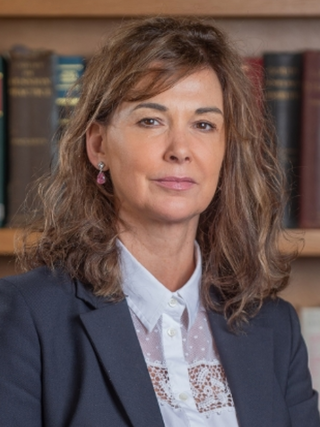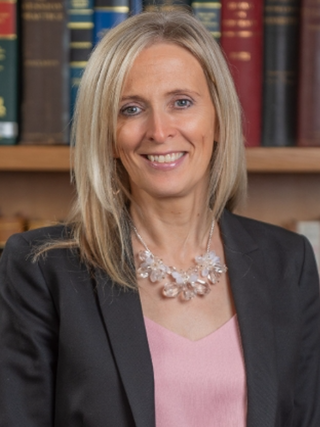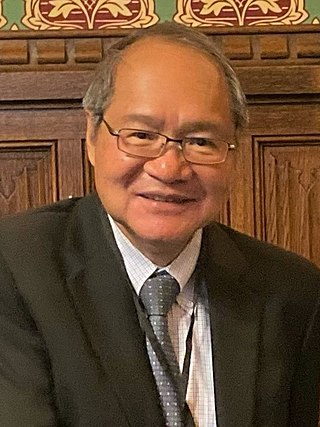In most common law jurisdictions, the attorney general or attorney-general is the main legal advisor to the government. In some jurisdictions, attorneys general also have executive responsibility for law enforcement, prosecutions or even responsibility for legal affairs generally. In practice, the extent to which the attorney general personally provides legal advice to the government varies between jurisdictions, and even between individual office-holders within the same jurisdiction, often depending on the level and nature of the office-holder's prior legal experience.
The Director of Public Prosecutions (DPP) is the office or official charged with the prosecution of criminal offences in several criminal jurisdictions around the world. The title is used mainly in jurisdictions that are or have been members of the Commonwealth of Nations.

The Crown broadly represents the state in all its aspects within the jurisprudence of the Commonwealth realms and their subdivisions. The term can be used to refer to the office of the monarch or the monarchy as institutions; to the rule of law; or to the functions of executive, legislative, and judicial governance and the civil service.

The Crown Prosecution Service (CPS) is the principal public agency for conducting criminal prosecutions in England and Wales. It is headed by the Director of Public Prosecutions.

In the United States, a district attorney (DA), county attorney, county prosecutor, state's attorney, prosecuting attorney, commonwealth's attorney, state attorney or solicitor is the chief prosecutor or chief law enforcement officer representing a U.S. state in a local government area, typically a county or a group of counties. The exact and scope of the office varies by state. Generally, the prosecutor represents the people of the jurisdiction. With the exception of three states, district attorneys are elected, unlike similar roles in other common law jurisdictions.

A prosecutor is a legal representative of the prosecution in states with either the common law adversarial system or the civil law inquisitorial system. The prosecution is the legal party responsible for presenting the case in a criminal trial against the defendant, an individual accused of breaking the law. Typically, the prosecutor represents the state or the government in the case brought against the accused person.
The Lord High Chancellor of Ireland was the highest judicial office in Ireland until the establishment of the Irish Free State in 1922. From 1721 to the end of 1800, it was also the highest political office of the Irish Parliament: the Chancellor was Speaker of the Irish House of Lords. The Lord Chancellor was also Lord Keeper of the Great Seal of Ireland. In all three respects, the office mirrored the Lord High Chancellor of Great Britain.

Peter Henry Goldsmith, Baron Goldsmith,, is a British barrister who served as Attorney General for England and Wales and Attorney General for Northern Ireland from 2001 and 2007. His resignation, announced on 22 June 2007, took effect on 27 June, the same day that Prime Minister Tony Blair stepped down. Goldsmith was the longest serving Labour attorney general. He is currently a partner and head of European litigation practice at US law firm Debevoise & Plimpton and Vice Chairperson of the Hong Kong International Arbitration Centre.
The Law Officers are the senior legal advisors to His Majesty's Government of the United Kingdom and devolved governments of Northern Ireland, Scotland and Wales. They are variously referred to as the Attorney General, Solicitor General, Lord Advocate, or Advocate General depending on seniority and geography - though other terms are also in use, such as the Counsel General for Wales. Law Officers in these roles are distinguished by being political appointees, while also being bound by the duties of independence, justice and confidentiality among the other typical professional commitments of lawyers. These roles do not have any direct oversight of prosecutions nor do they directly lead or influence criminal investigations. This is a distinguishing factor between Law Officers and the State Attorneys General of the United States or US Attorney General.

His Majesty's Advocate, known as the Lord Advocate, is the principal legal adviser of both the Scottish Government and the Crown in Scotland for civil and criminal matters that fall within the devolved powers of the Scottish Parliament. The Lord Advocate provides legal advice to the government on its responsibilities, policies, legislation and advising on the legal implications of any proposals brought forward by the government. The Lord Advocate is responsible for all legal advice which is given to the Scottish Government.

His Majesty's Solicitor General for Scotland is one of the Law Officers of the Crown, and the deputy of the Lord Advocate, whose duty is to advise the Scottish Government on Scots Law. They are also responsible for the Crown Office and Procurator Fiscal Service which together constitute the Criminal Prosecution Service in Scotland.

Crown attorneys or crown counsel are the prosecutors in the legal system of Canada.

The Crown Office and Procurator Fiscal Service is the independent public prosecution service for Scotland, and is a Ministerial Department of the Scottish Government. The department is headed by His Majesty's Lord Advocate, who under the Scottish legal system is responsible for prosecution, along with the sheriffdom procurators fiscal. In Scotland, virtually all prosecution of criminal offences is undertaken by the Crown. Private prosecutions are extremely rare.

The Solicitor-General for Ireland was the holder of an Irish and then United Kingdom government office. The holder was a deputy to the Attorney-General for Ireland, and advised the Crown on Irish legal matters. On rare occasions, there was also a Deputy Attorney-General, who was distinct from the Solicitor-General. At least two holders of the office, Patrick Barnewall (1534–1550) and Sir Roger Wilbraham (1586-1603), played a leading role in Government, although in Barnewall's case, this may be partly because he, was also King's Serjeant. As with the Solicitor General for England and Wales, the Solicitor-General for Ireland was usually a barrister rather than a solicitor.
A clerk of the peace held an office in England and Wales whose responsibility was the records of the quarter sessions and the framing of presentments and indictments. They had legal training, so that they could advise justices of the peace.
Major Sir Thomas Chalmers Hetherington,, better known as Sir Tony Hetherington, was a British barrister. He was Director of Public Prosecutions of England and Wales from 1977 to 1987, and was the first head of the Crown Prosecution Service for the year after it was founded in 1986.

The attorney-general of Singapore is the public prosecutor of the Republic of Singapore and legal adviser to the Government of Singapore. The attorney-general is the head of the Attorney-General's Chambers (AGC), whose staff carries out the functions of the attorney-general. The attorney-general is appointed by the president, on the advice of the prime minister, under Article 35 of the Constitution of Singapore. Unlike some countries that follow the Westminster parliamentary model, the attorney-general is not a Member of Parliament.

The Crown Law Office is the public service department charged with advising the New Zealand Government on legal affairs, representing the government in appellate cases, and overseeing the prosecution of criminal offences before the courts.

The Attorney General's Office (AGO) is a department of His Majesty's Government that supports the Attorney General and their deputy, the Solicitor General. It is sometimes referred to as the Legal Secretariat to the Law Officers.

Solicitor General for New South Wales, known informally as the Solicitor General, is one of the Law Officers of the Crown, and the deputy of the Attorney General. They can exercise the powers of the Attorney General in the Attorney General's absence. The Solicitor General acts alongside the Crown Advocate, and Crown Solicitor, and serves as one of the legal and constitutional advisers of the Crown and its government in the Australian state of New South Wales.
























































